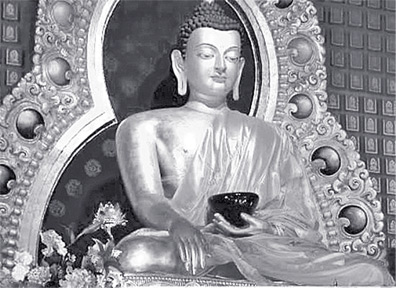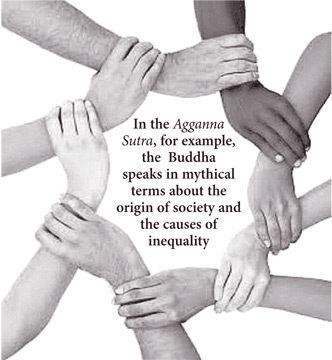|
Tomorrow is Bak Poya:
Fostering social harmony
A Buddhist perspective:
By Lionel Wijesiri
The Sinhala and Tamil New Year dawns tomorrow, when both Sinhalese
and Tamils together celebrate the national festival of the year. It is
truly a national event because of the spirit of goodwill and national
unity it brings to all communities and social groups.
The Sinhala and Tamil New Year is, therefore, treated as a catalyst
of social harmony. It is common knowledge that social harmony is the
most vital factor for the development of the country.
|

Buddha statue in Bhumisparsha Mudra. This hand gesture/mudra
calls upon the earth to witness Buddha’s enlightenment at
Bodh Gaya. A seated figure’s right hand reaches toward the
ground, palm inward. Symbolising harmony among people. |
When all communities rise in harmony, no hostile force can raise its
head and therefore the country’s peace will be further strengthened.
Social harmony is an evolving concept that few can visualise in its
final form.
Although the reality of social harmony is unchanging, what is
evolving is how we interact with and perceive those who are different
from us. We know that most of these differences are superficial and
unimportant. Yet, for many of us, these minor differences are what we
focus on first.
Sutras
When tomorrow’s Sinhala and Tamil New Year coincides with the Bak
Full Moon Poya Day, it may be an appropriate day to think about the
Buddhist viewpoint on social harmony.
A great deal has been spoken and written about the Buddha’s concern
for the social well-being of all living beings and humankind in
particular. While the greater part of his ministry was devoted to the
edification of those who renounced the worldly life, he was most free
with his advice to uplift the condition of the householder.
Some of the best known Sutras are devoted to the development of
social harmony and are addressed to royalty as well as common folk.
In the Agganna Sutra, for example, the Buddha speaks in mythical
terms about the origin of society and the causes of inequality; in the
Kasibharadvaja Sutra, he distinguishes between labour for spiritual
progress and labour to gain material wealth. In the Sigalovada Sutra, he
explains the duties and responsibilities of the different groups which
comprise society - parents, children, husbands, wives, employers,
employees, teachers and religious persons.
He speaks of the benefits to be derived when every member of a
community knows what is expected of him or her and sincerely fulfils his
or her obligations.
In the Parabhava Sutra, he enumerates the various forms of antisocial
behaviour which cause personal and social loss. In the Vyagghapajja
Sutra, he describes the benefits that can be gained by the householder
even without “going forth”.
In one section of the Mahaparinibbana Sutra, the Buddha explains the
government and national unity. In the Mangala Sutra, he enumerates good
social behaviour which obstructs misery and woe to the individual and
thereby the community.
From such evidence of the Buddha’s discourses, it is clear that early
Buddhists were very much concerned with the creation of social
conditions favourable to the individual cultivation of Buddhist values.
An outstanding example of this, in later times, is the remarkable
“welfare state” created by the Buddhist emperor, Asoka (B.C. 274-236).
Walpola Rahula stated the situation when he wrote that “Buddhism
arose in India as a spiritual force against social injustices, against
degrading superstitious rites, ceremonies and sacrifices; it denounced
the tyranny of the caste system and advocated the equality of all men;
it emancipated woman and gave her complete spiritual freedom.”
Live happily
Once, the Buddha accompanying many bhikkhus was touring Kosala
Janapada. One afternoon he reached a village named Veludvara. The
villagers respectfully gave him a warm welcome. After they took their
seats, the village head said, “Lord, we have a desire to live happily
with our family indulging in all pleasurable objects and also after
death we want to be reborn in a peaceful world. Please tell us the way
which fulfils our wishes if possible.”
The Buddha gave them a method as follows: “Everyone should think ‘I
am fond of my life and happiness, and averse to being tortured or
killed; other people also certainly feel like me; then why should I
treat them in ways which I would hate myself?
I should put myself in their place.’ And then everyone should refrain
from torment and taking lives, and they should tell one another not to
kill or torture others. If everyone practised like this, no one would
get into trouble about killing and torment.
Furthermore, everyone should think; I am in fear of losing my
possessions. If they are destroyed by thieves or robbers or saboteurs, I
will not be happy. Other people also will feel likewise if they lose
their possessions. Therefore, I should abstain from taking what is not
given or damaging other people’s property.
 I love my wife as well as other female relatives. I cannot condone
anyone having unlawful sexual behaviour with them. Needless to say,
other people also will have the same feeling. I love my wife as well as other female relatives. I cannot condone
anyone having unlawful sexual behaviour with them. Needless to say,
other people also will have the same feeling.
Human values
Then why should I commit adultery or indulge in sexual misbehaviour
with women? I hate people who spoil my reputation and fortune by telling
lies or cheating. Other people do not like being deceived too.
Therefore, I should not cheat others by physical or verbal action. If
someone estranged my friends from me by slander, it would not please me.
Other people also will dislike being separated from their friends.
Therefore, I should abstain from creating a rift between friends.
I love people who speak to me politely. No one likes to see or hear
impoliteness. Therefore, I should always behave towards others in a
polite way.
In this way, if everyone were to put himself in others’ place, all
people would be pure in all their manners and they would be able to live
happily without causing any harm either to themselves or others.
And then, social harmony prevails. Human values What is unique about
Buddhism is our understanding of the nature of the social values and why
we should practise them. When the Bodhisatta practised the Ten Paramis,
he was motivated in an entirely different way than any other follower of
a spiritual path either in part or as a whole.
Paramis
The ten paramis - dana (generosity), sila (precept), nekkhamma
(renunciation), panna (wisdom), viriya (energy), khanti (patience) sacca
(truthfulness), adhitthana (determination), metta (loving kindness) and
upekkha (equanimity) - can form a solid social value system on which a
Buddhist can build his or her personal spiritual life.
This individual effort is then extended to members of the family, the
community, the nation and finally the world as a whole. Buddhists all
over the world must consciously make the effort to understand the
importance of practising these values, endeavour to practice them
earnestly to create harmonious society.
We all know the famous Jataka story in which the Bodhisatta advises
his acrobat master. To ensure perfect safety each performer must be
fully concerned about his own welfare and security first. In that way
both parties will be safe.
Therefore, the implementing of a Buddhist value-system involves
making each individual understand his responsibility towards the rest,
to understand the inter-relatedness of all beings, to guard him or
herself and thereby guard others. The dawning New Year holds many
promises and challenges for all citizens in our country.
Buddhists are in a particularly strong position to help their fellow
members realise their full potential and live in harmony not only with
themselves but with others as well. ([email protected]) |

